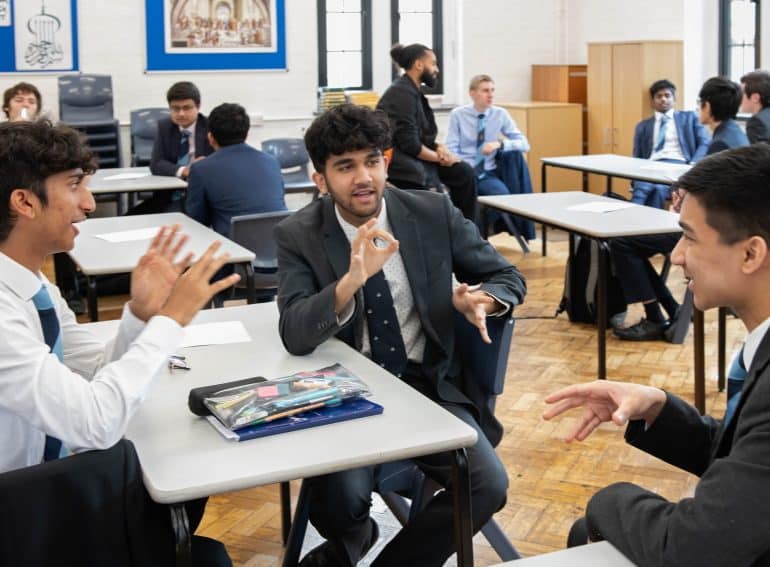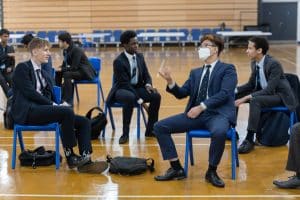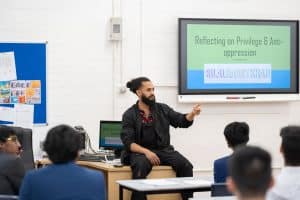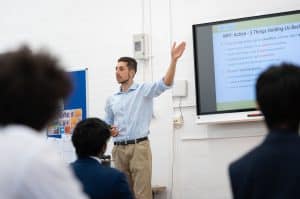
With their examinations behind them, Year 12 came into School for a series of workshops aimed at helping them prepare for a new academic year and at giving them a little time to reflect at the end of an extraordinary term.
 The socially-distanced pastoral workshops focused on the personal development of the sixth-formers, but also gave them a chance to catch up with their friends and teachers. In line with Government guidance about emerging from lockdown, QE has been providing opportunities for Years 10 and 12 especially to spend time at the School in recent weeks, beginning with end-of-year examinations for both year groups.
The socially-distanced pastoral workshops focused on the personal development of the sixth-formers, but also gave them a chance to catch up with their friends and teachers. In line with Government guidance about emerging from lockdown, QE has been providing opportunities for Years 10 and 12 especially to spend time at the School in recent weeks, beginning with end-of-year examinations for both year groups.
The Year 12 sessions, which were spread across two days, included: group assemblies led by Head of Year 12 Helen Davies; individual meetings with form tutors; guidance on the UCAS personal statement to ensure the boys are ready for their university applications next term, and workshops led by two Old Elizabethans, Bilal Harry Khan (2003-2010) and Kam Taj (2004-2011), both experts in their respective fields. Bilal’s workshop was entitled Reflecting on Privilege & Anti-oppression, while Kam’s theme was Intrinsic motivation.
Headmaster Neil Enright said: “We felt it important to give our Year 12s an opportunity to consider their own progress this year and to reflect on what has been happening in the wider world, while also looking forward to the new School year.
“We have worked with both Bilal and Kam before as a School and I was delighted that they were able to help us on this occasion by leading workshops which are both, in their different ways, of great importance for our pupils.”
 After leaving QE, Bilal read Theology at Cambridge. He then worked locally in Barnet in a post that involved helping keep young people safe in the borough. After that, he worked in the charities sector, at first running workshops for young people and then also beginning to design the workshops. He is now a diversity and inclusion practitioner, flying all over the world to talk to CEOs and other senior leaders about issues “that might be uncomfortable”. Bilal has also become an important national media voice on such issues.
After leaving QE, Bilal read Theology at Cambridge. He then worked locally in Barnet in a post that involved helping keep young people safe in the borough. After that, he worked in the charities sector, at first running workshops for young people and then also beginning to design the workshops. He is now a diversity and inclusion practitioner, flying all over the world to talk to CEOs and other senior leaders about issues “that might be uncomfortable”. Bilal has also become an important national media voice on such issues.
He told the Year 12 boys that in the wake of the Black Lives Matter protests, this was an important time to reflect on issues that, in fact, “have always been there”.
Among the activities during the workshop, he asked the boys to close their eyes while he read out a series of statements and to put their hands up if they could relate to that statement:
- “Did you have breakfast this morning” (all put their hands up)
- “Do you feel safe walking down the street at night” (most did)
- “When growing up, did you easily find books to read with characters from your background? (only one boy did)
- “When shopping, do you easily find plasters that match your skin colour” (again, only one)
- “Do you find it easy to gain access to a toilet when in town” (all).
The boys then discussed in pairs which statements stood out to them, and what it felt like when they kept their hands down for a question. In a group discussion, they examined whether they had previously thought about these issues, and if not, why not – which provoked comments such as “They don’t affect us,” and “We just accept it’s normal.”
On the question of “Do you feel comfortable calling the police if there is trouble?”, one boy answered in the negative, saying he “did not feel safe around the police”. Bilal pointed out that the police were meant to be there to keep everyone safe. This led on to a further discussion around BLM, looking at people’s bad experiences with the police, including the possibility of even losing one’s life, as George Floyd did in the US.
There was also a discussion about the concept of privilege, with Bilal challenging the participants to think about where privilege comes from. The boys again talked in pairs and fed back into a group discussion about how privilege is maintained. Citing the widely quoted axiom, “Privilege is invisible to those who have it”, Bilal stated: “By reflecting on this, we can make changes.”
Bilal encouraged the boys to consider the diverse aspects of “all human identity”, taking them through the components of the acronym, GRACES: Gender & Geography, Race & Religion, Age & Ability, Class & Culture, Ethnicity & Education, Sexuality & Spirituality.
 In his workshop, Kam, a performance coach and motivational speaker, began by asking the boys how motivated they felt on a scale of 1–10 by a show of hands. One placed himself at 1 and most said 5 or 6, with none saying 8, 9 or 10.
In his workshop, Kam, a performance coach and motivational speaker, began by asking the boys how motivated they felt on a scale of 1–10 by a show of hands. One placed himself at 1 and most said 5 or 6, with none saying 8, 9 or 10.
The aim of the workshop, he explained, was for them to think about what motivates them and about what they could do to boost their motivation.
Kam described motivation as a “fire from within”; boys should not rely on other people or external circumstances to motivate them – “The only chance of our fire burning brightly and sustainably comes from within.”
At Cambridge, Kam saw other students seemingly having it all – getting everything done academically, whilst playing varsity-level sport and having great social lives. It was only in his third year that he “got it together” himself, he told the groups.
After university, he became a management consultant, which gave him opportunities to start looking at what separates top performers from others.
He then developed his ‘motivational fire formula’, which involves a combination of heat, fuel and oxygen. The heat is the intention (“What’s my goal and why I want it”), the fuel is realisation (“Being aware of what we want and making it happen”) and the oxygen is action (“Just do it!”). He added that actions need to continue in order to keep motivation going (“Action begets action”). Worrying, however, could serve as a “fire blanket of expectation” in this model, stopping people from taking actions.
He invited the boys to reflect on this formula – and on what they are missing in their lives. The formula could be stated as an equation: Motivation = intention + realisation + action – expectation
Looking further at intentions, Kam asked the boys what their goals were. The answers included “getting into medical school”, “being a great climber”, “being happy and getting by”, “being more successful than my parents in ten years”.
“The more clarity we have about what we want, the better the actions we choose,” said Kam.
He then went through the eight criteria of “empowering goals”, namely: values-driven; enriching; controllable; attainable; specific; measurable; flexible and harmless (to oneself and others).
He emphasised the importance of being positive, urging the sixth-formers to “think about the person you want to become”. They should focus not on what they want to avoid, but on what they want to attain, he advised. “If you say: ‘I don’t want to fail’, you are still focusing on failure.”
Kam also introduced the power of visualisation, giving as an example the fact that he used to visualise himself sitting in the examination room at university completing a three-hour paper calmly and confidently.
